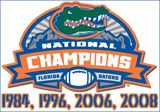“They” Don’t Get It
Urban Meyer isn’t as well known, philosophically, as conventional wisdom would have you believe.
Whenever Meyer’s coaching career is mentioned, discussion of the “spread” or “spread option” is sure to follow. Conventional wisdom holds that a Meyer coached team experiences an “offensive explosion” in the second year under his tutelage, as happened at Bowling Green and Utah.
When it came to Florida however, that conventional wisdom was wrong. Over the past 4 years, the Gator’s offense progressed as follows –
Zook
2003 – 30.0 points per game
2004 – 31.8 points per game
Meyer
2005 – 28.6 points per game
2006 - 29.7 points per game
Not only was there an imperceptible increase in offense between 2005 and 2006, the points per game decreased since the Zook years. Yet, the overall record went from 8-5 and 7-5 to 9-3 and 13-1.
Conventional wisdom doesn’t know squat. And most certainly, conventional wisdom has no understanding of either the “spread”, or Meyer’s offensive philosophy.
“They” simply don’t get it.
Meyer himself has said it a number of times – the offensive at Florida is built around the talent (read quarterback) available. While the “spread” itself is not well understood (especially by ESPN talking heads), over the past two years we have seen only elements of the spread adapted to Leak’s style, and very little of a spread option.
Meyer has a definitive coaching philosophy which extends to all facets of team preparation and play. And the number one tenet of that philosophy may surprise you, but that tenet is essential to understanding the spread. It is ...
Play Great Defense.
That, my friends, is the number one directive of Florida football, or any Meyer coached team.
But that doesn’t mean merely the obvious – stop the opposing offense. What it means in large part is playing offensive football that doesn’t put your defense in a bad position. Football that moves the chains, controls the clock, and wins the battle of field position. It also means excellent special team play for field position.
How does Meyer’s offensive do this? Well from what we have gotten to see thus far, by instituting elements of the spread that allows the quarterback to read defenses and decrease the chances of devastating situations like quarterback blind side hits, sacks and turnovers. In a Meyer offense, the quarterback is responsible for getting rid of the ball quickly in nearly all situations – there is very little standing in the pocket.
Some fans accustomed to Spurrier offenses didn’t like the Meyer system at first (and surely some still do not). The deep ball, a low percentage play in any offense, has not been a large part of the Gator’s offense over the past two years.
One statistic that shows the success of Meyer’s offense that is virtually ignored by experts and pundits is time of possession. A Meyer offense seeks to control the clock – and thus the game. Look at the difference between average time of possession statistics for Meyer and Zook –
Zook
2002 – 28:58
2003 – 26:58
2004 – 28:13
Meyer
2005 – 32:37
2006 – 31:08
A further look at two games against LSU illustrate this difference.
First the 2004 game. Zook teams were infamous for late game meltdowns in which opposing offenses came back to win. The 2004 LSU game at Florida was won by LSU 24-21 on a 4th quarter touchdown drive with 27 seconds left. In that game, LSU destroyed Florida in the time of possession category 36:07 to 23:53, in which LSU ran 83 offensive plays to UF’s 59. The Florida defense simply had nothing left in their tank by the end of the game.
Now, look at the LSU game this year which Florida won 23-10. In that game, Florida won the time of possession battle 32:35 to 27:25. It was LSU’s defense that spent 5 more minutes on the field.
Note the scores of the two games, both at the Swamp. In 2004 Florida scored 21 and lost. In 2006, Florida scored 23 and won.
If you Play Great Defense on all sides of the ball, a score in the low 20’s is good enough, especially if you keep the opposing defense on the field and exhaust them.
It is notable that Florida’s sole loss in 2006 was the opposite – Auburn’s time of possession was 36:43 to 23:17.
And that BCS title game? Try an unbelievable time of possession for Florida of 40:48 to only 19:12 for Ohio State.
We can expect the lack of understanding of the nature of Meyer’s offensive philosophy to continue into the next season. Certainly, it is evident now. Michael at “Braves and Birds - The Atlanta Sports Blog” shows one of the common misunderstandings in an otherwise excellent post on Stewart Mandel when he says –
“And let's not forget this gem of a statement:
'Urban Meyer has obviously showed that the spread is perfectly capable of working in the SEC'
I must have missed Meyer proving that his offense works in the SEC last year when the Gators never scored more than 26 offensive points on any SEC defense.”
Absolutely true. Also true is that the Gators scored NO LESS THAN 17 points on every SEC opponent this season, a feat only exceeded by Arkansas at 21 points. Other SEC team’s minimum points in SEC play were -
Alabama 13
Auburn 7
Georgia 14
Kentucky 0
LSU 3
Mississippi 0
Ole Miss 3
South Carolina 0
Tennessee 14
Vanderbilt 10
Of the two times UF scored 17, one was barely good enough for a win (South Carolina) and the other should have been (Auburn).
The point is, you don’t have to score a lot of points to win. If, however, you keep your opponent from scoring through a combination of effective defense, special teams and intelligent offensive play, you will win.
This philosophy may bother many Gator fans accustomed to Spurrier’s gaudy offensive numbers. However, winning is the point, not bombing some helpless team into near triple digits. Plus, Spurrier’s philosophy, while overwhelming successful, carried a risk of exhausting his defenses, which tended to spend a great deal of time on the field because the offense scored so quickly. In his long Florida career, Spurrier’s defenses surrendered 21 or more points 60 times, or an average of 5 times per year. (Of those 25 were losses). Seven times a Spurrier offense scored 30 or more points and lost the game.
Thus far, Meyer’s teams have given up 21 or more points 8 times, but only 2 times this past year for 1 loss and 1 win.
To understand Meyer’s strategy, one has to realize that not only is defense-defense, offense and special teams ARE defense. The “spread” is not so much about scoring big points as it is about clock control, field position and not making mistakes.
To that extent, the “spread” did work.
Just don’t expect “them” to understand.





 Mentioned in Austin Murphy's book
Mentioned in Austin Murphy's book 


4 comments:
very good analysis. i was never able to articulate this as succinct as you have in this piece...never could put my finger on it. kudos to you!
for this reason, i believe tebow and co. can offset the defense as it matures and hits the home stretch this coming year. if we can just beat tennessee, the rest of the SEC (and nation) better watch out!
i can just see tebow now, plodding down the field, wearing out defenses, forcing opposing offenses to force things, losing rhythm, etc....
go gators!
"They" suck!
I am pretty sure that winning the SEC proves that Meyer's all around strategy worked like a charm. Call it the spread, call it defense, call it manna from heaven, as long as we can call it a WIN.
Good post!
Mergz, definitely one of your best analyses ever. Great job!
Very good analysis, Mergz.
Unlike Zook and his "prevent" mode we saw in the second half of games that either helped him win games by the seat of his pants or ultimately cost him a win, Meyer FINDS a way to win.
It's easy for critics of the Meyer spread offense, Gator fans and non-Gators alike, to pan this new scheme. What we saw in the first two years was more of a "hybrid" version tailored to work with Chris Leak's skillset. Now that Tim Tebow's our starter we should see more of the true spread-option.
Defense was more of the focus in 2006; Jamie brings up a good point about offense now being the stronger of the two in 2007 given the 9 new starters with limited gametime experience.
I see us as being serious contenders for another NC in 2008 and/or 2009; as long as we keep recruiting as strongly as we have been and maintaining a winning record we'll be in good shape for years to come under Urban Meyer.
GO GATORS!!!!!!
Post a Comment